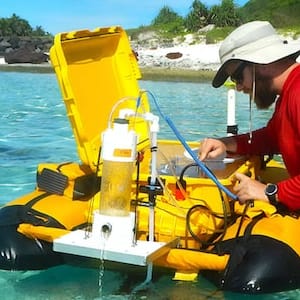backwater: Idiom Meaning and Origin
What does ‘backwater’ mean?
Backwater refers to a place or situation that is isolated, stagnant, or unaffected by current trends or developments.

Idiom Explorer
"High and dry" is an idiom that means to be left in a difficult or helpless situation, especially without any assistance or support.
The idiom "go nowhere" means to make no progress or to have no effect. It can be used to describe a situation, a plan, or a person's actions that are unproductive or leading to no meaningful outcome.
The idiom "go back in time" means to return to a previous period or moment in history, often used figuratively to express the desire or possibility of revisiting past events or changing past actions.
The idiom "fish out of water" refers to a person who feels uncomfortable or out of place in a particular situation or environment.
The idiom "dial back" means to reduce or lessen something, often used in the context of scaling down intensity, aggression, or speed.
The idiom "deep water" refers to being in a difficult or challenging situation that is hard to escape from. It implies being in trouble or facing problems that one may find difficult to overcome.
The idiom "bogged down" means to become stuck or overwhelmed by something, usually resulting in a lack of progress or a loss of efficiency. It refers to a situation where one feels trapped or mired in a difficult or time-consuming task, leading to a sense of frustration or inertia.
Diving into Isolated Regions
The idiom "backwater" is derived from the combination of the words "back" and "water." In its literal sense, it refers to a body of water that is stagnant or flows slowly, away from the main current. This term is used metaphorically to describe a place that is remote, isolated, or lacking progress. It is generally used to convey a sense of underdevelopment, backwardness, or being left behind.
The origin of the idiom can be traced back to the early 19th century. Its first recorded use can be found in Francis Grose's "Dictionary of the Vulgar Tongue" published in 1811, where it was defined as "A dull out of the way place." This suggests that this idiom has a long history and has been in use for centuries. Over time, it has become firmly rooted in the English language and is widely understood by native speakers.
In contemporary usage, the term "backwater" is often employed to describe rural or remote areas that are perceived as being less developed or culturally stagnant compared to urban or progressive regions. It is sometimes used to criticize these places for their perceived lack of advancement or modernization. Additionally, the idiom is also employed in a figurative sense to describe situations or endeavors that are seen as outdated, unproductive, or unimportant within a larger context.
The idiom "backwater" can be used in various contexts, including discussions about politics, economics, culture, and technology. It is a versatile term that allows speakers and writers to convey a nuanced meaning depending on the specific context. For example, it can be used to criticize a government's neglect of certain regions, highlight the divide between rural and urban areas, or comment on the relative lack of progress in a particular industry or field.
It is worth noting that the idiom has a negative connotation, and its usage can sometimes perpetuate stereotypes or perpetuate a sense of superiority towards less-developed areas. While the idiom has a clear meaning and is widely understood, it is essential to use it judiciously and consider its potential implications.
The idiom "back forty" is related to the idiom "backwater." It is commonly used in rural or agricultural contexts to describe the remote or less accessible portion of a farm or land. This term emphasizes the idea of being situated far away from the more central or populated areas, similar to how a backwater is considered remote or isolated. The idiom "back forty" can conjure up images of vast, undeveloped expanses of land that are removed from the hustle and bustle of urban life.
The idiom "back in" is another related phrase that can be linked to the concept of a backwater. It is often used in conversations about returning to a previous state or situation, especially one that is considered less advanced or forward-thinking. This idiom suggests a regression or retreat from progress or innovation, which aligns with the idea of a backwater being a place that lacks development or is stagnant.
The idiom "back-burner" is also connected to the idiom "backwater." It refers to the act of postponing or deprioritizing something, often in favor of more urgent or important matters. This term carries the implication that the task or issue being put on the back-burner is deemed less significant or pressing, similar to how a backwater is perceived as less important or unprogressive. The idiom "back-burner" highlights the idea of relegating something to a less favorable or attention-worthy position.
The idiom "backpedal" can be associated with the idiom "backwater" in terms of actions or decisions being reversed or retracted. When someone backpedals, they retract or revise what they previously said or did. This concept of going back on one's word or reversing a course of action reflects the notion of a backwater as a place or situation that lacks progress or is considered outdated. The idiom "backpedal" conveys the idea of moving in the opposite direction or backtracking, which aligns with the sense of being left behind associated with a backwater.
The idiom "back to the wall" is also related to the idiom "backwater" in the sense of being in a difficult or challenging position with limited options or resources. When someone has their back to the wall, they are facing adversity or pressure and may feel trapped or cornered. This idiom conveys the idea of being constrained or confined, which resonates with the notion of a backwater being a place that lacks opportunities or progress. The idiom "back to the wall" suggests a state of being stuck or limited in a similar way to being in a backwater.
The idiom "backwater" has a long history and is commonly used in the English language. Its metaphorical meaning refers to a place or situation that is remote, isolated, or lacking progress. It can be employed to describe underdeveloped regions or criticize outdated practices. While the idiom is widely understood, caution should be exercised in its usage to avoid perpetuating stereotypes or creating a sense of superiority. The idiom continues to be relevant in contemporary discourse, and its usage allows for a nuanced understanding of various social, economic, and cultural contexts.
Example usage
Examples of how the idiom "backwater" can be used in a sentence:
- After moving to the big city, John found it difficult to adjust to the slow pace of life in his hometown, which he now considered a backwater.
- The small village, nestled in a remote valley, had no access to modern amenities and was considered a backwater by the neighboring towns.
- Despite its historical significance, the town remained a backwater in terms of economic development, with limited opportunities for job seekers.
More "Location" idioms



